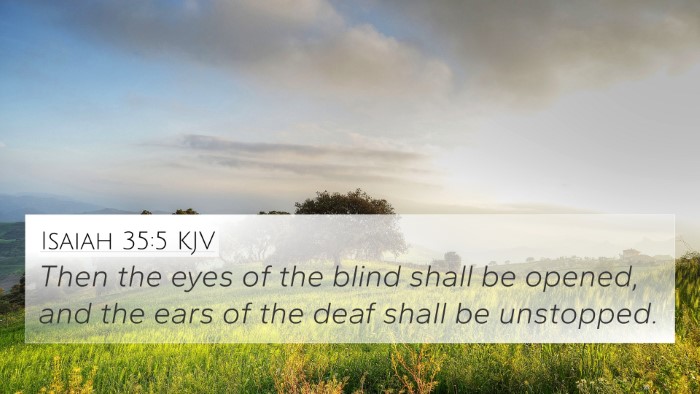Understanding Isaiah 50:5
Verse: “The Lord God has opened my ear, and I was not rebellious; I turned not backward.” (Isaiah 50:5)
Overview of the Verse
This verse reveals the deep communication between God and His servant (often understood as Israel or the Messiah). It highlights the open ear of the servant, which signifies readiness to listen and obey, contrasting with rebellion and disobedience.
Insights from Commentaries
-
Matthew Henry:
Henry emphasizes the importance of obedience to God’s call. The servant's willingness to listen shows that true discipleship involves not only receiving God’s instructions but also acting upon them. The mention of not being rebellious showcases a heart aligned with God's will.
-
Albert Barnes:
Barnes draws attention to the metaphor of God opening ears as an invitation to divine understanding and compliance. He points to the significance of the servant's response, which is a commitment to follow God’s guidance without hesitation.
-
Adam Clarke:
Clarke interprets this verse as an acknowledgment of God's grace. The act of having the ear opened signifies readiness for God's instruction, which leads to a life lived in servitude and faithfulness. He notes that the servant deliberately chooses to obey, demonstrating faith in God's plan.
Key Themes
The verse encapsulates several vital themes:
- Obedience: The servant's heart is open and ready to follow God.
- Response to God's Call: Highlights the importance of listening to God’s voice.
- Divine Communication: Shows the intimate relationship between God and His servant.
Cross-References for Isaiah 50:5
This verse connects dynamically with various other scriptures:
- James 1:22: “But be doers of the word, and not hearers only, deceiving yourselves.” - Emphasizes action as a response to God’s instruction.
- Psalm 40:6-8: “In sacrifice and offering you have not delighted, but you have given me an open ear...” - Reflects on the theme of divine listening and obedience.
- Isaiah 42:1: “Behold my servant, whom I uphold, my chosen, in whom my soul delights...” - Connects with the concept of the servant chosen by God.
- Romans 10:17: “So faith comes from hearing, and hearing through the word of Christ.” - Illustrates the necessity of listening for faith.
- Jeremiah 42:6: “Whether it is good or bad, we will obey the voice of the Lord our God...” - A commitment similar to that expressed in Isaiah 50:5.
- Matthew 12:18: “Behold, my servant whom I have chosen...” - A New Testament reference aligning with the concept of the servant.
- Acts 3:22-23: References Jesus as the Prophet who speaks what God commands.
Thematic Connections and Analysis
Isaiah 50:5 serves as a pivotal point for understanding the overarching narrative of obedience and servanthood in both the Old and New Testaments. The connection between multiple scriptures allows for a deeper exploration of themes such as:
- God’s Call: The idea that God calls each individual to listen and respond.
- Servanthood: The model of Christ representing the ultimate servant who listens and responds to God's will.
- Faith and Action: The necessity of both hearing and doing in the life of a believer.
Connecting Themes Through Cross-Referencing
Utilizing tools for Bible cross-referencing, one can explore how Isaiah 50:5 relates to various passages throughout scripture. Here are some useful methods:
- Bible Concordance: An essential tool to find specific terms and their occurrences in scripture.
- Bible Cross-Reference Guide: Helpful for discovering thematic links across the biblical texts.
- Cross-Reference Bible Study: A method that encourages deeper understanding through connecting verses.
Conclusion
Isaiah 50:5 serves as a powerful reminder of the importance of listening and responding to God. Through the lens of various commentaries and extensive cross-referencing, one can further appreciate the intricate design of scripture that invites believers into a dynamic relationship with the Creator.













